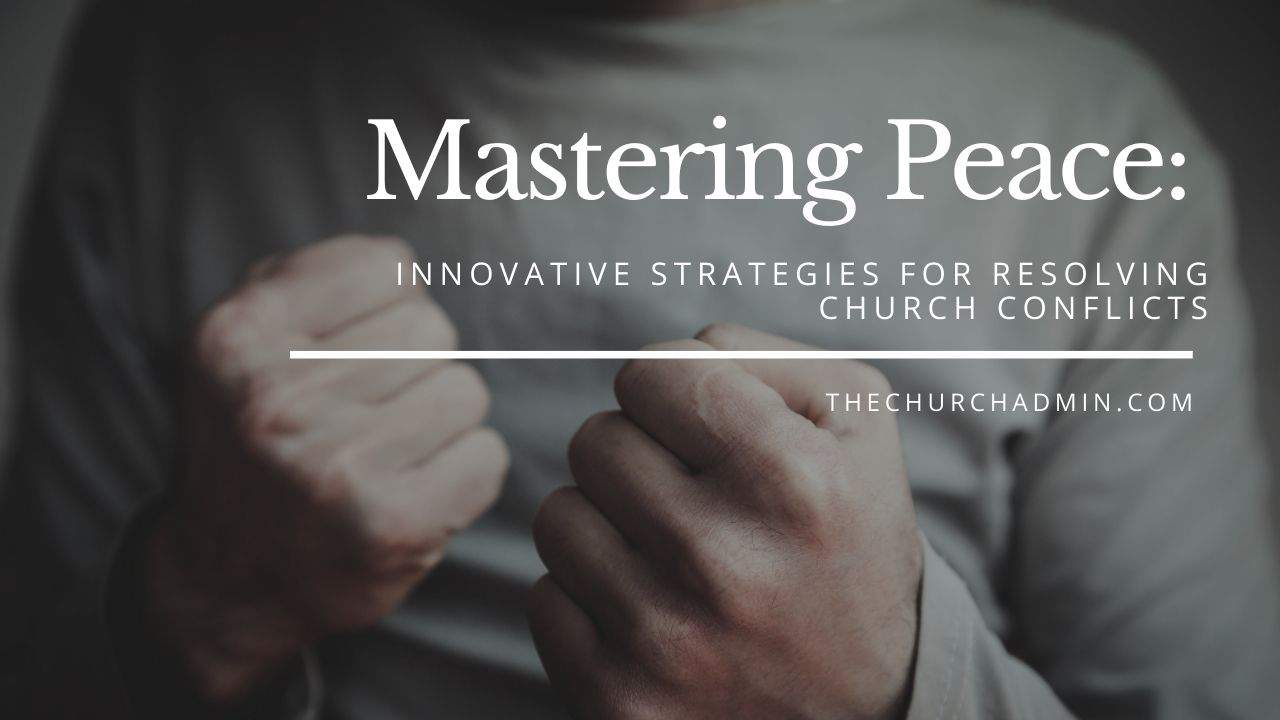Mastering Peace: Innovative Strategies for Resolving Church Conflicts
Conflict is a natural part of human interaction, and the church community is no exception. As places of worship strive to be bastions of peace and understanding, the role of faith leaders in navigating and resolving conflicts cannot be overstated. This post delves into ten innovative strategies to help church leaders effectively mediate disputes, ensuring their congregations can focus on spiritual growth and unity.
Key Strategies:
1. Lead by Example
Faith leaders must embody the virtues of patience, understanding, and compassion. Demonstrating Christ-like behavior in your own life sets a powerful precedent for your congregation, encouraging them to emulate these qualities in times of conflict.
Key Points:
- Exhibit patience and understanding in personal interactions.
- Practice forgiveness, echoing Ephesians 4:32 – “Be kind and compassionate to one another, forgiving each other, just as in Christ God forgave you.”
Actionable Steps:
- Reflect daily on personal actions and decisions.
- Seek feedback on your leadership from trusted members.
- Engage in community service as a visible act of leadership.
Bible Verses for Sermons:
- Matthew 18:15-17 on resolving conflicts directly.
- James 1:19 about being quick to listen, slow to speak.
Sermon Ideas:
- “The Art of Peaceful Resolution: Lessons from Matthew 18”
- “James 1:19 – The Foundation of Effective Communication”
2. Incorporate Teachings into Sermons
Integrating conflict resolution principles into sermons and teachings can arm your congregation with the tools they need to approach disagreements constructively. This proactive measure helps create a culture of understanding and forgiveness.
3. Emphasize Direct Communication
Encourage members to address grievances directly with those involved before the issue escalates. This approach fosters a culture of openness and honesty, essential for resolving conflicts amicably.
Benefits Table:
| Benefit | Description |
| Prevents Misunderstandings | Direct communication allows for clear expression of thoughts and intentions, reducing the chance for misunderstandings. |
| Builds Trust | Honest and open dialogue fosters a sense of trust among church members. |
| Enhances Community Cohesion | By addressing issues directly, the church community can avoid divisions and strengthen bonds. |
Bible Reference:
- Proverbs 12:18 – “The words of the reckless pierce like swords, but the tongue of the wise brings healing.”
4. Practice Active Listening
Active listening is crucial in conflict resolution. Teach your congregation to listen with empathy, seeking to understand the other person’s perspective fully before responding. This can transform potential conflicts into opportunities for growth and learning.
Key Points:
- Focus fully on the speaker, showing empathy and understanding.
- Avoid formulating a response while the other person is speaking.
Actionable Steps:
- Repeat back what you’ve heard to ensure understanding.
- Ask open-ended questions to delve deeper into the speaker’s perspective.
Bible Reference:
- James 1:19 – Encourages swift listening, slow speaking, and slow anger.
5. Limit External Interference
While seeking counsel is important, excessive outside involvement can complicate conflicts. Encourage resolution within the immediate church community to strengthen bonds and understanding among members.
Advantages Table:
| Advantage | Impact on Conflict Resolution |
| Enhances Privacy | Keeps sensitive discussions within the trusted community. |
| Fosters Autonomy | Empowers the church to resolve its own issues, strengthening unity. |
| Reduces Bias | Limits the influence of external opinions, focusing on core values. |
Bible Reference:
- 1 Corinthians 6:1-6 – Advises resolving disputes within the church community.
6. Facilitate Effective Mediation
Offer mediation as a neutral ground for disputing parties. A well-conducted mediation session can lead to constructive solutions that respect everyone’s needs and concerns.
Mediation Process Steps:
- Preparation: Setting ground rules, choosing a neutral location.
- Clarification: Each party shares their perspective without interruption.
- Negotiation: Finding common ground and agreeing on a resolution.
Bible Reference:
- Matthew 5:9 – “Blessed are the peacemakers, for they will be called children of God.”
7. Set Clear, Achievable Goals
When addressing conflicts, outline clear, achievable goals for the resolution process. This helps keep discussions focused and productive, leading to more sustainable outcomes.
Goals Setting Tips:
- Define specific, measurable outcomes.
- Ensure goals are realistic and achievable within a reasonable timeframe.
- Regularly review progress and adjust goals as needed.
Bible Reference:
- Philippians 3:14 – Paul talks about pressing on toward the goal to win the prize of God’s heavenly calling.
8. Positive Openings and Closures
Begin and end each conversation with positive affirmations or scripture, framing the discussion in a context of love and respect. This can significantly impact the tone and outcome of the conversation.
Techniques:
- Start with a prayer or a positive affirmation.
- End with a mutual understanding or an agreement to disagree respectfully.
Bible Reference:
- Colossians 4:6 – “Let your conversation be always full of grace, seasoned with salt, so that you may know how to answer everyone.”
9. Define Expectations Clearly
Establishing clear expectations for behavior and communication within your church can prevent many conflicts. Regularly revisit these expectations to ensure they remain relevant and are upheld.
Expectations Chart:
| Expectation | Description |
| Respectful Communication | Encourage speaking with kindness and without judgment. |
| Confidentiality | Discussions should remain private to build trust. |
| Commitment to Resolution | Both parties should commit to working towards a mutual resolution. |
Bible Reference:
- Ephesians 4:25 – “Therefore each of you must put off falsehood and speak truthfully to your neighbor, for we are all members of one body.”
10. Promote Unity through Bonding Activities
Organize activities that strengthen the bonds within your congregation. Shared experiences build empathy and understanding, laying a strong foundation for resolving future conflicts.
Activity Ideas:
- Community service projects.
- Retreats focused on team-building and spiritual growth.
- Group discussions on faith, life, and personal growth.
Bible Reference:
- Ecclesiastes 4:9-12 12 highlights the strength found in companionship and teamwork.
FAQs on Church Conflict Resolution
- What is the first step in resolving a conflict within the church?
- The first step is to encourage direct communication between the parties involved, following the guidance of Matthew 18:15-17, to address the issue privately and respectfully.
- How can faith leaders encourage active listening in conflict situations?
- Faith leaders can model active listening by giving full attention to speakers, restating their points for clarity, and asking open-ended questions to deepen understanding.
- When should a mediator be involved in a church conflict?
- A mediator should be involved when initial attempts at resolution have failed and an impartial third party can facilitate understanding and agreement.
- What are some effective mediation techniques for church conflicts?
- Effective techniques include setting clear ground rules, ensuring both sides are heard without interruption, and guiding parties towards mutual understanding and agreement.
- How can church leaders prevent conflicts from escalating?
- By setting clear expectations for behavior, encouraging open and respectful communication, and addressing issues promptly and fairly before they escalate.
- Can scripture help in resolving church conflicts? If so, how?
- Yes, scripture can offer wisdom and guidance. Verses like Ephesians 4:32 and Colossians 3:13 emphasize forgiveness and patience, which are key in conflict resolution.
- What role do bonding activities play in preventing church conflicts?
- Bonding activities strengthen community ties, build empathy, and improve understanding among members, reducing the likelihood of conflicts.
Conclusion:
Conflict resolution is an ongoing journey, requiring patience, empathy, and dedication. By adopting these strategies, faith leaders can foster a culture of understanding and peace within their congregations. Remember, the goal is not to avoid conflict but to resolve it in a way that strengthens the community and glorifies God.





